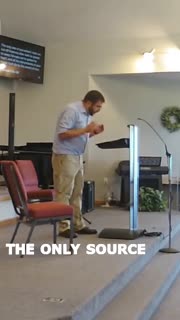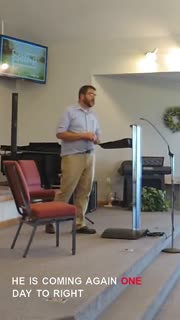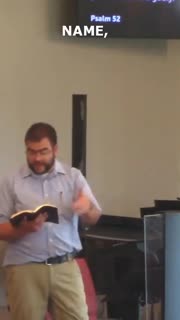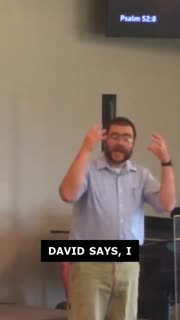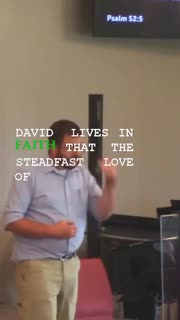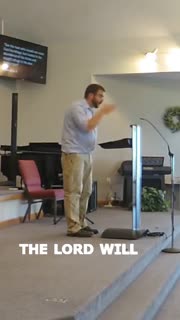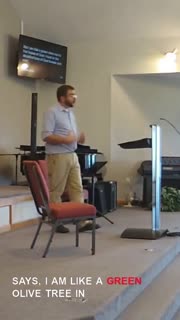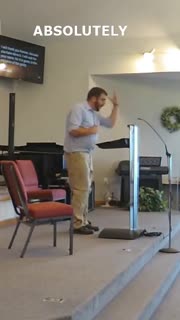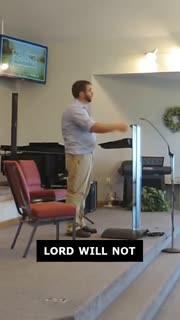Trusting God's Love Amidst Wickedness and Betrayal
Devotional
Sermon Summary
Bible Study Guide
Sermon Clips
### Quotes for Outreach
1. "The only source of power and stability that we can, that can be trusted, the only source of power and stability that we should depend upon comes not at the point of a spear. It doesn't grow out of a ballot box, but rather it must come from the steadfast, unchanging, immovable love of God. For his people. Any other source of power is false, and it will one day betray you." [36:33] (29 seconds)
2. "He is coming again one day to right every injustice, to heal every wound, to dry every tear, and to swallow up death forever. And we wait for that day because it is good. That's what the psalm says. I will wait for your name. I will wait for your glory because it is good." [45:29] (21 seconds)
3. "We too face an unrelenting pressure to place our faith in something other than the Lord. And that proclivity is revealed when we engage in activities that fall short of that standard that has been set. Loving the Lord our God with all of our heart, soul, mind, and strength and loving our neighbor as ourselves, we are revealing that we are placing our faith in something other than God." [38:12] (60 seconds)
4. "David says, I am like a green olive tree. Olive trees can live for hundreds and even thousands of years. I'm like a green olive tree that is fresh, that is strong, because I trust in the steadfast love of God." [29:34] (14 seconds)
5. "David finds his stability in trusting the steadfast love of God. And he says in verse nine that I will thank you forever because you have done it. I will wait for your name for it is good in the presence of the Godly." [29:34] (18 seconds)
### Quotes for Members
1. "David lives in faith that the steadfast love of God will not allow this evil to prosper. He will not allow evil to stand. Judgment will come upon this man. And all the things that this man is trusting in will be torn down, will be uprooted, will be taken away from him." [24:21] (22 seconds)
2. "The Lord will judge the idolatry of our hearts. And there is no other God who can save us. And in fact, it says that the thing that this man trusted in, this thing that he was depending on, will one day be his destruction." [25:53] (21 seconds)
3. "David says, I am like a green olive tree in the house of the Lord. I trust, not in violence, not in power, not in money, not in influence, but I trust that God is going to help me. I trust in the steadfast love of God forever and ever." [27:42] (18 seconds)
4. "David is so absolutely certain that God is not going to let this evil stand, that he is already thanking God for having fixed it, for having judged it, for having made it right again." [31:21] (13 seconds)
5. "The constant and consistent story of the Bible is that however strong those gods might seem, however alluring their worship might be, they cannot be relied upon. Because those who trust in them will find their destruction alongside of them. But those who trust in the Lord will not be moved. They will be unshakable." [39:56] (60 seconds)
Ask a question about this sermon
1. "The only source of power and stability that we can, that can be trusted, the only source of power and stability that we should depend upon comes not at the point of a spear. It doesn't grow out of a ballot box, but rather it must come from the steadfast, unchanging, immovable love of God. For his people. Any other source of power is false, and it will one day betray you." [36:33] (29 seconds)
2. "He is coming again one day to right every injustice, to heal every wound, to dry every tear, and to swallow up death forever. And we wait for that day because it is good. That's what the psalm says. I will wait for your name. I will wait for your glory because it is good." [45:29] (21 seconds)
3. "We too face an unrelenting pressure to place our faith in something other than the Lord. And that proclivity is revealed when we engage in activities that fall short of that standard that has been set. Loving the Lord our God with all of our heart, soul, mind, and strength and loving our neighbor as ourselves, we are revealing that we are placing our faith in something other than God." [38:12] (60 seconds)
4. "David says, I am like a green olive tree. Olive trees can live for hundreds and even thousands of years. I'm like a green olive tree that is fresh, that is strong, because I trust in the steadfast love of God." [29:34] (14 seconds)
5. "David finds his stability in trusting the steadfast love of God. And he says in verse nine that I will thank you forever because you have done it. I will wait for your name for it is good in the presence of the Godly." [29:34] (18 seconds)
### Quotes for Members
1. "David lives in faith that the steadfast love of God will not allow this evil to prosper. He will not allow evil to stand. Judgment will come upon this man. And all the things that this man is trusting in will be torn down, will be uprooted, will be taken away from him." [24:21] (22 seconds)
2. "The Lord will judge the idolatry of our hearts. And there is no other God who can save us. And in fact, it says that the thing that this man trusted in, this thing that he was depending on, will one day be his destruction." [25:53] (21 seconds)
3. "David says, I am like a green olive tree in the house of the Lord. I trust, not in violence, not in power, not in money, not in influence, but I trust that God is going to help me. I trust in the steadfast love of God forever and ever." [27:42] (18 seconds)
4. "David is so absolutely certain that God is not going to let this evil stand, that he is already thanking God for having fixed it, for having judged it, for having made it right again." [31:21] (13 seconds)
5. "The constant and consistent story of the Bible is that however strong those gods might seem, however alluring their worship might be, they cannot be relied upon. Because those who trust in them will find their destruction alongside of them. But those who trust in the Lord will not be moved. They will be unshakable." [39:56] (60 seconds)
